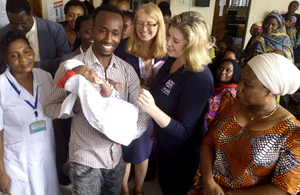New UK aid package will improve the quality of education in every primary and lower secondary school in Tanzania
International Development Secretary Penny Mordaunt announces new UK support to improve education, family planning and legal systems on visit to country.

International Development Secretary Penny Mordaunt visits a family planning clinic in Tanzania. Picture: DFID Tanzania
Young people in Tanzania will be empowered to take control of their future prosperity through a new package of UK support, the International Development Secretary Penny Mordaunt announced today.
On her visit to the country Ms Mordaunt unveiled plans for the UK to work in partnership with Tanzania to help harness the potential of young people, who hold the key to unlocking the country’s economic growth.
Ms Mordaunt has set out a package of UK support which will help improve the quality of education in every primary and lower secondary school across the country. This includes making sure that girls move on to secondary schools and that disabled children can access education.
By giving the next generation the vital education and skills they need for the future, the UK is working with Tanzania to help their economy grow – giving millions of young people the chance to build the future they want to see for their country.
Ms Mordaunt also visited a family planning clinic to see how UK aid will be scaling up its provision of modern, voluntary and safe family planning methods. This will enable 800,000 women every year across Tanzania to have greater control over when and how many children they have.
The expansion of family planning access will not only prevent 6,200 maternal deaths, but allow women to make the most of their education and opportunities so that they can contribute to the growth of their societies and communities.
The International Development Secretary Penny Mordaunt said:
As Tanzania grows, it’s essential that young people and women are empowered to take control of their lives, education and health, fulfil their potential and play a role in the future prosperity of their country.
The resulting economic growth is opening up opportunities for UK business in the country, as we move towards a future of shared prosperity.
Also during her visit, Ms Mordaunt travelled to Dar es Salaam port to see how the UK is sharing expertise to help Tanzania crack down on organised crime and corruption which hold back development. This includes strengthening border posts to prevent trafficking of products from the Illegal Wildlife Trade.
Notes to Editors
- The UK is providing a family planning package (£55 million) which will scale up family planning services across rural and urban Tanzania, enabling women to safely plan their pregnancies. This will:
- Reach around 800,000 women with modern, voluntary and safe family planning support every year and avert 6200 maternal deaths. This is an increase from the previous programme which reached 300,000 women a year
- Reach the most marginalised and vulnerable women in Tanzania including those in refugee camps, youth and people with disabilities
- Care for victims of sexual violence
- Strengthen Tanzania’s family planning services so that it ultimately can provide these for its own people, for example by training staff
- Work to increase the commitment of other donors, and to get the Government of Tanzania to step up its support
- The next phase of DFID Tanzania’s education programme (£41.6 million) will:
- Work to reform Tanzania’s education system so it can ultimately be self-sustaining
- Increase the quality of education in all primary and lower secondary schools in Tanzania, including reaching marginalised children such as those with disabilities
- Support more girls to transition into secondary school, and improve teacher training.
- The UK will provide £8 million to share UK expertise to improve Tanzania’s criminal justice and legal systems to help tackle corruption which holds back development.